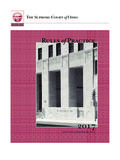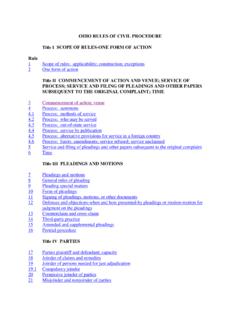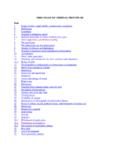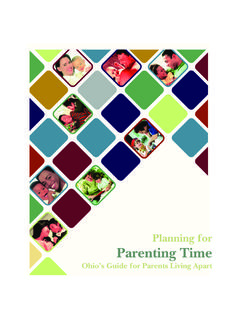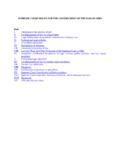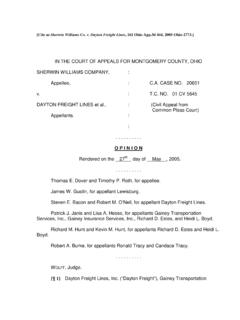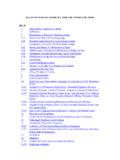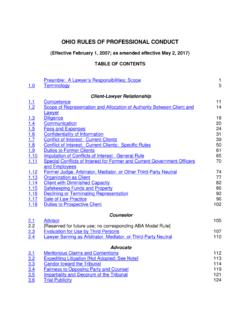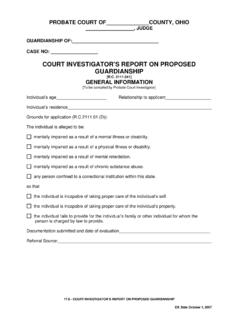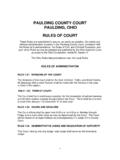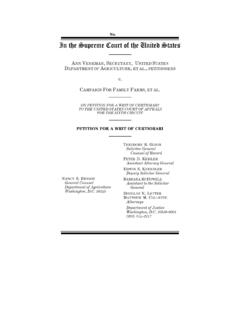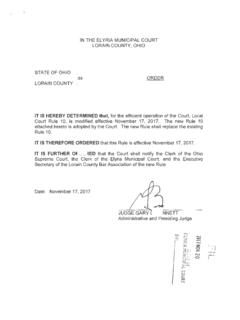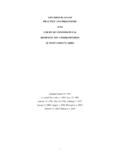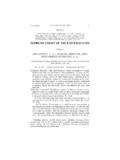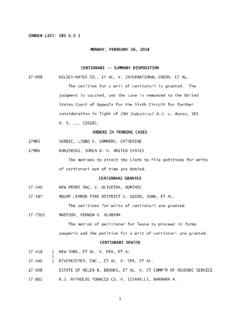Transcription of Rules for the Government of the ... - Supreme Court of Ohio
1 Supreme Court Rules FOR THE Government OF THE judiciary OF ohio Rule I Professional Responsibility and Judicial Ethics II Disciplinary Procedure III Disability Retirement, Removal, or Suspension of Judges IV Mandatory Continuing Legal Education for the judiciary V Judicial College VI Reference of Civil Action Pursuant to Section of the Revised Code VII Duties of Judge Leaving Office XX Title RULE I. Professional Responsibility and Judicial Ethics. Section 1. Applicability. The ohio Rules of Professional Conduct, effective February 1, 2007, as amended, shall be binding upon all persons admitted to practice law in ohio . The willful breach of the Rules by a Justice, judge, or candidate for judicial office shall be punished by reprimand, suspension, disbarment, or probation as provided in Gov. Jud. R. II and Gov. Bar R. V. The ohio Code of Judicial Conduct, effective March 1, 2009, as amended, shall be binding upon all judicial officers of this state and candidates for judicial office.
2 The willful breach of the Code shall be punished by reprimand, suspension, disbarment, or probation as provided in Gov. Jud. R. II and Gov. Bar R. V, or by retirement, removal, or suspension from office, as provided in Gov. Jud. R. III. Section 2. Duty of Lawyers. It is the duty of the lawyer to maintain towards the courts a respectful attitude, not for the sake of the temporary incumbent of the judicial office, but for the maintenance of its Supreme importance. Justices and judges, not being wholly free to defend themselves, are peculiarly entitled to receive the support of lawyers against unjust criticism and clamor. Whenever there is proper ground for serious complaint of a judicial officer, it is the right and duty of the lawyer to submit a grievance to the proper authorities. These charges should be encouraged and the person making them should be protected. [Effective: July 1, 1983; amended effective October 1, 1986; January 1, 1988; January 1, 1993, February 1, 2007; May 2, 2017.]
3 ] RULE II. Disciplinary Procedure. Section 1. Board of Professional Conduct of the Supreme Court . There is created under Rule V of the Supreme Court Rules for the Government of the Bar of ohio a Board of Professional Conduct of the Supreme Court . The Board shall receive evidence, preserve the record, make findings, and submit recommendations to the Supreme Court as follows: (A) Concerning complaints of misconduct that are alleged to have been committed by a justice, judge, or candidate for judicial office; (B) Concerning allegations that a justice or judge is unable to discharge the duties of judicial office by virtue of a mental or physical disability; (C) Upon reference by the Supreme Court of conduct by a justice, judge, or candidate for judicial office affecting any proceeding under these Rules or the Supreme Court Rules for the Government of the Bar of ohio , where the acts allegedly constitute a contempt of the Supreme Court or a breach of these Rules but did not take place in the presence of the Supreme Court or a member of the Supreme Court , whether by willful disobedience of any order or judgment of the Supreme Court or an order or subpoena issued by the Board of Professional Conduct, by interference with any officer of the Supreme Court in the prosecution of any duty, or otherwise.
4 Nothing in this section shall be construed as limiting or affecting the plenary power of the Supreme Court to impose punishment with reference either to contempts or breaches of these Rules committed in its presence or the plenary power of any other Court with reference to contempts committed in its presence. Section 2. Authority and Duty of Disciplinary Counsel and Certified Grievance Committees. (A) Except as provided in Gov. Bar R. V and Section 5 of this rule, a grievance alleging misconduct of a judge or candidate for judicial office, or alleging that a judge is unable to discharge the duties of judicial office by virtue of a mental or physical disability, shall be filed with the Office of Disciplinary Counsel or with a grievance committee certified pursuant to Gov. Bar R. V. The Office of Disciplinary Counsel and certified grievance committees shall have authority to investigate grievances, file formal complaints with the Board, and prosecute formal complaints filed with the Board.
5 (B) Except as provided in Section 5 and 6 of this rule, a grievance alleging misconduct of the Chief Justice or a justice of the Supreme Court , or alleging that the Chief Justice or a justice of the Supreme Court is unable to discharge the duties of judicial office by virtue of a mental or physical disability, shall be filed with the Office of Disciplinary Counsel. The Office of Disciplinary Counsel shall review the grievance to determine whether an ethical violation is alleged. If the grievance alleges an ethical violation, the Office of Disciplinary Counsel promptly shall forward the grievance to the Chief Judge of the Court of Appeals, elected pursuant to section of the Revised Code, for further proceedings in accordance with Section 4 of this rule. A grievance alleging misconduct by a former Chief Justice or justice of the Supreme Court shall proceed pursuant to Gov.
6 Bar R. V or division (A) of this section. Section 3. Application of Rule. A grievance or complaint involving alleged misconduct by a justice, judge, or judicial candidate; all proceedings for the discipline of a justice, judge, or judicial candidate; and all proceedings with regard to the alleged inability of a justice or judge to discharge the duties of judicial office by virtue of a mental or physical disability shall be brought, conducted, and disposed of in accordance with the provisions of this rule and Gov. Bar R. V. Sections 4 and 6 of this rule contain provisions for adjudicating grievances and complaints against a justice of or candidate for the Supreme Court . Section 5 of this rule contains provisions for adjudicating campaign grievances and complaints against a candidate for a trial Court or Court of appeals. Section 4. Grievances Against Supreme Court Justices.
7 (A) Initial review. (1) Upon receipt of a grievance from the Office of Disciplinary Counsel, the Chief Judge of the Court of Appeals shall select, by lot, a three-member review panel from among the judges designated pursuant to division (A)(3) of this section. The review panel shall contact the justice named in the grievance for a written response within fourteen days to the allegations contained in the grievance. Upon request, the review panel may grant a reasonable extension of time for the justice to provide a response. (2) Upon receipt of the response, or if no response is received, the review panel shall review the grievance and any response to determine whether good cause exists for further investigation of the grievance. The review panel shall report its determination in writing to the Chief Judge. If the review panel determines that good cause does not exist for further investigation, the Chief Judge shall notify the grievant of the determination and of the dismissal of the grievance.
8 (3) In January each year, the administrative judge of each appellate district shall designate one appellate judge from the district, other than the presiding judge, to be eligible for service on a review panel pursuant to division (A)(1) of this section. The administrative judge shall advise the Chief Judge, in writing, of the designation. Appointments shall be for a calendar year, and a judge may be reappointed to subsequent terms on the review panels. (B) Appointment of special disciplinary counsel; time limits. (1)(a) If the review panel determines that good cause exists for further investigation, the Chief Judge shall appoint a special disciplinary counsel to conduct further investigation of the allegations contained in the grievance and any other misconduct discovered during the course of investigating the grievance. The special disciplinary counsel shall possess the qualifications set forth in division (B)(3)(a) of this section and may be appointed from the list maintained by the Office of Disciplinary Counsel pursuant to division (B)(3)(c) of this section.
9 (b) The investigation of a grievance by special disciplinary counsel shall be concluded within sixty days from the date the grievance is transmitted to special disciplinary counsel, and a decision on disposition of the grievance shall be made within thirty days after the conclusion of the investigation. Extensions of time for completion of the investigation may be granted by the Chief Judge upon written request and for good cause shown, provided that an investigation for which one or more extensions are granted shall be completed within one hundred fifty days from the date the grievance is transmitted to special disciplinary counsel. Extensions beyond one hundred fifty days may be granted by the Chief Judge in the event of pending litigation or appeals, an unusually complex investigation, including the investigation of multiple grievances, time delays in obtaining evidence or testimony of witnesses, or for other good cause shown.
10 No investigation shall extend more than one year from the date the grievance is transmitted to special disciplinary counsel. (c) The time limits set forth in this rule are not jurisdictional. No grievance filed shall be dismissed unless it appears that there has been an unreasonable delay and that the rights of the respondent to a fair hearing have been violated. An investigation that extends beyond one year from the date the grievance is transmitted to special disciplinary counsel is prima facie evidence of unreasonable delay. (2)(a) Upon completion of the investigation, special disciplinary counsel shall either report to the Chief Judge that the grievance should be dismissed or prepare and file a formal complaint with the Chief Judge, in the name of special disciplinary counsel as relator, alleging that substantial, credible evidence exists to believe that the justice named in the grievance engaged in misconduct.
